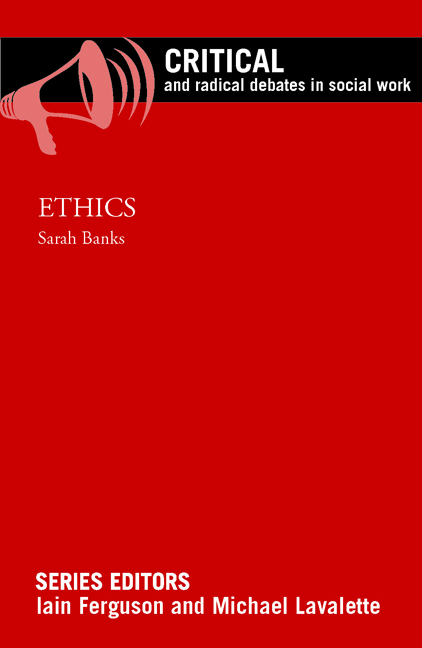Book contents
- Frontmatter
- Contents
- List of tables, figures and boxes
- List of contributors
- one Introduction
- Section 1 Ethics: Research and provision in health and social care
- Section 2 Law, management and ethics in health and social care
- Section 3 Ethics: From the start of life to the end
- Index
- Also available from The Policy Press
nineteen - Ethics and euthanasia
Published online by Cambridge University Press: 22 January 2022
- Frontmatter
- Contents
- List of tables, figures and boxes
- List of contributors
- one Introduction
- Section 1 Ethics: Research and provision in health and social care
- Section 2 Law, management and ethics in health and social care
- Section 3 Ethics: From the start of life to the end
- Index
- Also available from The Policy Press
Summary
Summary
Public support for laws that allow medical practitioners to end life by active measures has risen in recent years, but the medical profession in the UK has been reluctant to endorse this development. The obvious benefits to a few people who experience extremes of suffering towards the end of life need to be balanced against the interests of those who might feel pressurised to opt for death in a society where euthanasia becomes an acceptable and well-known solution to the problems of old age. Additionally, the effect on practitioners (usually doctors) who are called on to administer lethal treatments requires consideration. This chapter reports surveys of the relatives and friends of people who have died, as well as surveys of medical practitioners, to provide empirical evidence that deepens understanding of how moral and ethical dilemmas play themselves out in practice.
Introduction
End of life decision making requires consideration of numerous potential harms and benefits that may arise from particular decisions. Some of these consequences may be immediate, obvious and personal. For example, there are obvious benefits in relieving an individual's suffering and in avoiding inappropriate life-sustaining therapies. Other harms and benefits are less obvious and often unintended. For example, potential harm may be done to efforts to establish good palliative care services if the option of legal euthanasia is available. There may be harms involved in allowing a system that places pressure on vulnerable people to opt for euthanasia. On the other hand it may be argued that in a system that permits medical actions to end life there are beneficial effects of open disclosure that allows scrutiny of these actions.
For the general public of media-saturated countries like the UK, the more obvious consequences are more easily appreciated. Mass media therefore often focus on these outcomes, providing a diet of personalised stories of end of life care that generally demonstrate the benefits of relieving individual suffering through acts of euthanasia (McInerney, 2000; Hausmann, 2004). Coupled with a general decline in religious attachment and the rise in rationalist and consumerist ideologies, the overall effect, in recent years, has been to raise levels of public support for legal measures that allow medical practitioners to end life by active measures (Seale, 1997).
- Type
- Chapter
- Information
- EthicsContemporary Challenges in Health and Social Care, pp. 269 - 282Publisher: Bristol University PressPrint publication year: 2007



